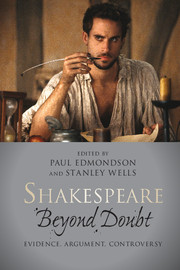Book contents
- Frontmatter
- Content
- List of illustrations
- List of contributors
- General introduction
- Part I Sceptics
- Part II Shakespeare as author
- 6 Theorizing Shakespeare's authorship
- 7 Allusions to Shakespeare to 1642
- 8 Shakespeare as collaborator
- 9 Authorship and the evidence of stylometrics
- 10 What does textual evidence reveal about the author?
- 11 Shakespeare and Warwickshire
- 12 Shakespeare and school
- 13 Shakespeare tells lies
- Part III A cultural phenomenon: Did Shakespeare write Shakespeare?
- Afterword
- A selected reading list
- Notes
- Index
13 - Shakespeare tells lies
from Part II - Shakespeare as author
Published online by Cambridge University Press: 05 April 2013
- Frontmatter
- Content
- List of illustrations
- List of contributors
- General introduction
- Part I Sceptics
- Part II Shakespeare as author
- 6 Theorizing Shakespeare's authorship
- 7 Allusions to Shakespeare to 1642
- 8 Shakespeare as collaborator
- 9 Authorship and the evidence of stylometrics
- 10 What does textual evidence reveal about the author?
- 11 Shakespeare and Warwickshire
- 12 Shakespeare and school
- 13 Shakespeare tells lies
- Part III A cultural phenomenon: Did Shakespeare write Shakespeare?
- Afterword
- A selected reading list
- Notes
- Index
Summary
The obvious place to look for information about a writer is in contextual sources. Hence the relevance of historical and biographical study of literature. But there are distinctions to be made. Poets of the Romantic period seem far nearer to us, and more is in fact known about them: as a result, they appear much more symbiotic on the world about them. Elizabethan writers derive much less, or less clearly, from their time and place. Such knowledge as can be gained may prove a matter of generalization, gossip and myth. Because of the lapse of four centuries, even what is recovered and regarded as circumstantial data may well conflict with deep-rooted snobbish or romantic or simply wilful presuppositions in the enquirer.
Being foxed can lead a researcher to search the work itself for answers it was never intended to give. Some editors and critics suppose that they can find in the Sonnets of Shakespeare a fair young man, and then settle to dispute which Earl he might turn out to be. This kind of interpretation will be wrong from the start, a fact not encouraging to historical scholars. Literature is, as Aristotle once came near to arguing, metaphorical. But there are closer studies of poets’ work that look for information. Scholars who hope to find evidence there, in questions – for instance – of collaboration and attribution, will test Shakespeare's literary and verbal style for what it tells of identity. Such analyses are often interesting, but dogged by a problem that I have never seen properly articulated. Most good actors are brilliant mimics, of their colleagues, their friends and any passing public figures. This seems certain to be true of Burbage and likely to be true of Shakespeare. The gift of imitation was equally likely to have pervaded the poet's verbal style, its gigantic richness, inventiveness and variety gratefully or amusedly absorbing anything of character that offered itself.
- Type
- Chapter
- Information
- Shakespeare beyond DoubtEvidence, Argument, Controversy, pp. 145 - 160Publisher: Cambridge University PressPrint publication year: 2013



